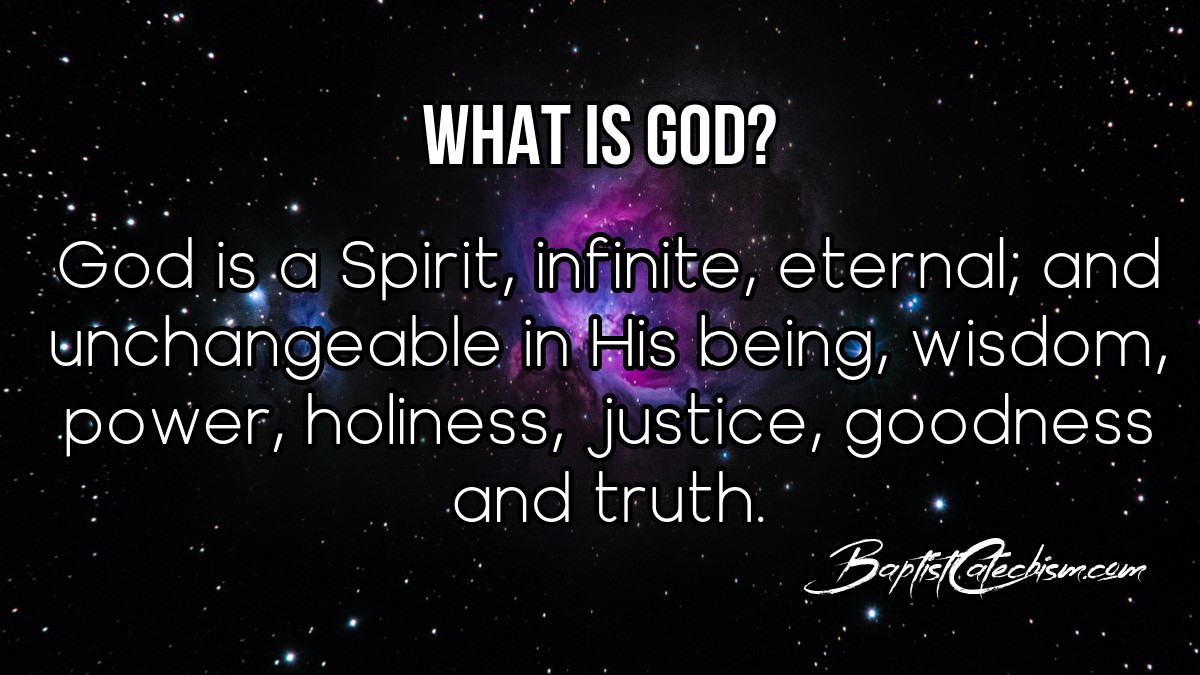Question 7b – What Is God?
“Before the mountains were brought forth, or ever you had formed the earth and the world, from everlasting to everlasting you are God.” – Psa 90:2 ESV 1
Before the mountains were brought forth. Before those elder giants had struggled forth from nature’s womb, as her dread firstborn, the Lord was glorious and self sufficient. Mountains to him, though hoar with the snows of ages, are but new born babes, young things whose birth was but yesterday, mere novelties of an hour. Or ever thou hadst formed the earth and the world. Here too the allusion is to a birth. Earth was born but the other day, and her solid land was delivered from the flood but a short while ago. Even from everlasting to everlasting, thou art God, or, “thou art, O God.” God was, when nothing else was. He was God when the earth was not a world but a chaos, when mountains were not upheaved, and the generation of the heavens and the earth had not commenced. In this Eternal One there is a safe abode for the successive generations of men. If God himself were of yesterday, he would not be a suitable refuge for mortal men; if he could change and cease to be God he would be but an uncertain dwelling place for his people. The eternal existence of God is here mentioned to set forth, by contrast, the brevity of human life. [Spurgeon]
Before the mountains were brought forth, Or “were born” (b), and came forth out of the womb and bowels of the earth, and were made to rise and stand up at the command of God, as they did when he first created the earth; and are mentioned not only because of their firmness and stability, but their antiquity: hence we read of the ancient mountains and everlasting hills, Gen 49:26, for they were before the flood, and as soon as the earth was; or otherwise the eternity of God would not be so fully expressed by this phrase as it is here, and elsewhere the eternity of Christ, Prov 8:25, or “ever thou hadst formed the earth and the world”; the whole terraqueous globe, and all the inhabitants of it; so the Targum; or “before the earth brought forth; or thou causedst it to bring forth” (c) its herbs, plants, and trees, as on the third day:
even from everlasting to everlasting, thou art God; and so are his love, grace, and mercy towards his people, and his covenant with them; and this is as true of Jehovah the Son as of the Father, whose eternity is described in the same manner as his; see Prov 8:22, and may be concluded from his name, the everlasting Father; from his having the same nature and perfections with his Father; from his concern in eternal election, in the everlasting covenant of grace, and in the creation of all things; and his being the eternal and unchangeable I AM, yesterday, today, and for ever, is matter of comfort to his people. [Gill]
Answer – God is a Spirit, infinite, eternal; and unchangeable in His being, wisdom, power, holiness, justice, goodness and truth.
Downloadable Coloring Page for Younger Children and Workpage for Older Children
Photo by Samantha Sophia on Unsplash
1 Editor’s note: The catechism source used for this project (noted in the works cited page) actually cites Psalm 110:2 for “eternal.” However, the London Baptist Confession, in the same work, cites Psalm 90:2 for “eternal.” The editor has preferred Psalm 90:2 in this instance.

- Weeping for Spurgeon: A Time of Unrelenting Misery and Darkness - October 19, 2021
- Beating the Drudgery of Bible Reading Plans - May 18, 2021
- How Did God Create Man? – Part 2: Question 13 B - December 21, 2020









